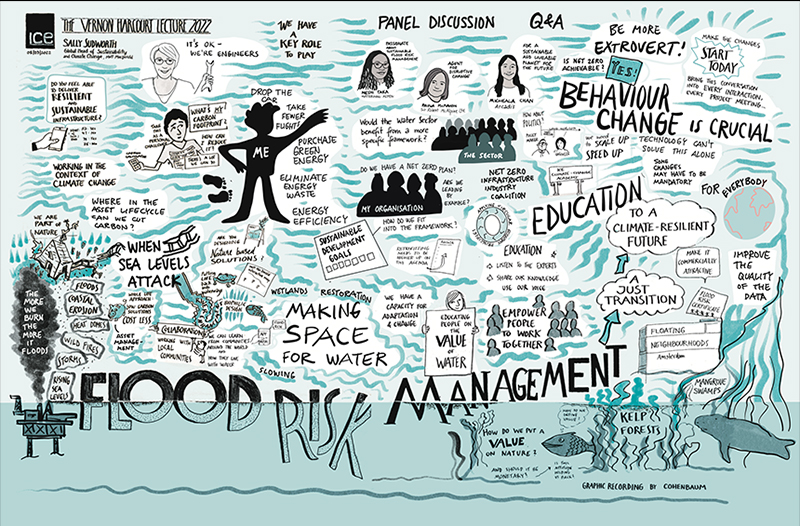Vernon Harcourt Lecture 2022
Contents |
[edit] In brief
The 2022 Vernon Harcourt lecture, was delivered by Sally Sudworth, global head of sustainability and climate change at Mott MacDonald.
As it stands, entire economies still revolve around fossil fuels, with people around the world relying on them for not just their livelihoods but also their way of life. Making the switch to a sustainable way of living won’t happen overnight, but green infrastructure can play a huge part in creating a cleaner, greener, healthier world.
As we look forward to COP27 for climate and COP15 for biodiversity, the debate about whether COP26 was a success continues. We, as engineers, are a community of professionals that is uniquely placed to do something positive. This is as exciting and rewarding as it is demanding.
We must safeguard the globe’s precious resources, creating balanced outcomes against the UN Sustainable Development Goals. We have a duty to ensure, to the best of our ability, that the infrastructure we deliver for our clients will be resilient to the impacts of climate change from wildfires, drought, extremes of temperature (freezing conditions to heat domes) to flooding. But resilience is just part of it, we also have need to factor in carbon reduction, making a conscious effort to reduce the amount we are locking in, both in construction and operation.
[edit] Headlines
Vernon Harcourt Lecture attendees felt more able to tackle climate change and move to net zero following the ICE event.
( Visual minutes of the Vernon Harcourt Lecture, produced by Cohenbaum for ICE.)
Not knowing exactly what’s needed to fight climate change isn’t a reason to delay action, a sustainability expert has argued. “It’s okay not to have all the answers at the outset. If you’ve got a vision and know where you want to go, just make a start,” said Sally Sudworth, global head of sustainability and climate change at Mott MacDonald.
The lecture, Flood-risk Management – a Just Transition to a Climate Resilient Future, linked engineering activities to the increase in climate disasters.Sudworth, who also spoke at COP26 last year, encouraged the audience to find ways they can contribute to climate action, personally and professionally.Before the lecture, attendees were asked whether they felt able to deliver resilient and sustainable infrastructure.
At the start, 52% said yes. By the end of the event, and following the speakers' calls to action, this figure had increased to 76%.
[edit] Discussing the attitudes towards climate change and net zero
The keynote speech was followed by a panel discussion, chaired by Paula McMahon, regional supervising officer at Sir Robert McAlpine and ICE Trustee.
The panel was made up of Sudworth, Meshi Taka, associate director at Waterman Aspen, and Micheala Chan, assistant engineer at Arcadis and ICE President Future Leader 2020/21.
They fielded questions from the audience about developing a specific framework for the water sector and whether net zero is achievable by construction firms.They also discussed the socio-political aspects of a just transition to net zero, and how engineers can use lived experience to build better.
Taka and Chan echoed Sudworth’s call for engineers to take action.
“Take this as a personal challenge and hold yourself accountable,” said Taka.
The Vernon Harcourt lecture is named after British civil engineer Leveson Francis Vernon-Harcourt, an ICE member and author of a number of treatises on river and harbour engineering.
[edit] Picking up momentum
The next ICE prestige lecture will be the Gerald Lacey Lecture, Just Add Water: a History of Irrigation Management in India since Gerald Lacey.
It will be delivered by Ijsbrand de Jong, water resources specialist at World Bank Group. This will be a virtual event, with more details to follow soon.
[edit] Get involved
To support the ICE in its commitment to sustainability and tackling climate change, apply to get involved in the Knowledge Networks. These are groups set up to identify and address key infrastructure challenges facing the profession.
This article originally appeared as 'make a start even if you don't have all the answers sustainability expert urges' on the ICE News and blog site on March 24.
--ICE
Articles about flooding on Designing Buildings include:
- BRE flood resilient repair project.
- Building flood resilience.
- Catchment flood management plan.
- Changing attitudes to property flood resilience in the UK.
- Coastal defences.
- Dam construction.
- Dyke.
- Elevated construction.
- Fighting flooding in the 21st century.
- Flash flood.
- Flood and Water Management Act.
- Flood defences.
- Flood Insurance.
- Flood level.
- Flood mapping key to future development in Wales.
- Flood plain.
- Flood recoverability.
- Flood resilience.
- Flood resistance.
- Flood risk assessment.
- Flood risk.
- Flood risk management plan.
- Floodscape.
- Flood warning system.
- Floodwater.
- Flood zone.
- Future flood prevention.
- Future Water, The Government’s water strategy for England.
- Levee.
- Natural flood management.
- Planning for floods.
- Property flood resilience.
- Submersible bridge.
- Sustainable urban drainage systems.
- Temporary flood defences.
- Ten years on - Lessons from the Flood on building resilience.
- Types of flood.
- Water engineering.
- Water table.
Featured articles and news
The first line of defence against rain, wind and snow.
Building Safety recap January, 2026
What we missed at the end of last year, and at the start of this...
National Apprenticeship Week 2026, 9-15 Feb
Shining a light on the positive impacts for businesses, their apprentices and the wider economy alike.
Applications and benefits of acoustic flooring
From commercial to retail.
From solid to sprung and ribbed to raised.
Strengthening industry collaboration in Hong Kong
Hong Kong Institute of Construction and The Chartered Institute of Building sign Memorandum of Understanding.
A detailed description from the experts at Cornish Lime.
IHBC planning for growth with corporate plan development
Grow with the Institute by volunteering and CP25 consultation.
Connecting ambition and action for designers and specifiers.
Electrical skills gap deepens as apprenticeship starts fall despite surging demand says ECA.
Built environment bodies deepen joint action on EDI
B.E.Inclusive initiative agree next phase of joint equity, diversity and inclusion (EDI) action plan.
Recognising culture as key to sustainable economic growth
Creative UK Provocation paper: Culture as Growth Infrastructure.
Futurebuild and UK Construction Week London Unite
Creating the UK’s Built Environment Super Event and over 25 other key partnerships.
Welsh and Scottish 2026 elections
Manifestos for the built environment for upcoming same May day elections.
Advancing BIM education with a competency framework
“We don’t need people who can just draw in 3D. We need people who can think in data.”






















